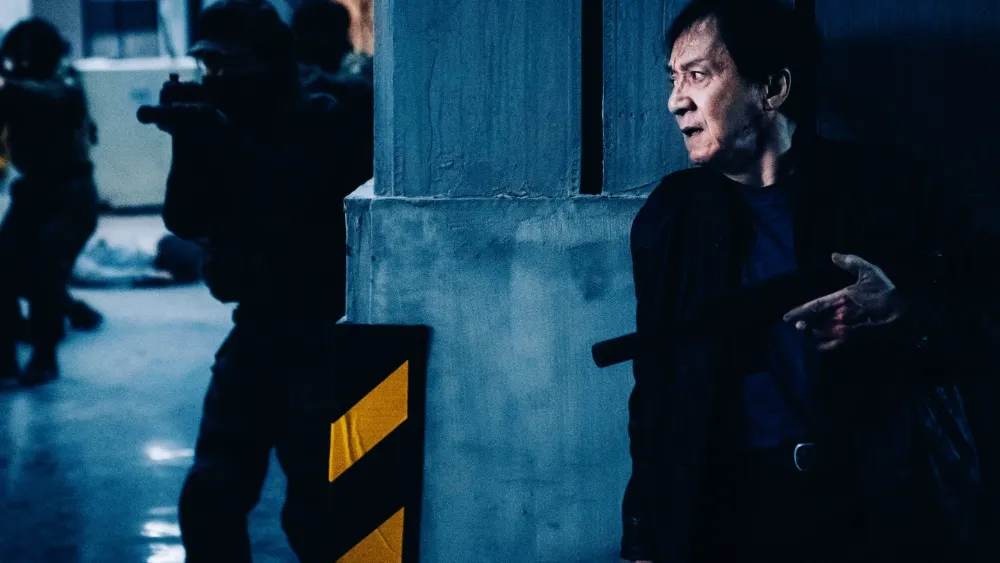
Jackie Chan was initially reluctant to play another police officer. But when director Larry Yang approached him with “The Shadow’s Edge,” the action legend found himself drawn back to familiar territory for their next collaboration following 2023’s “Ride On.”
“At first, I didn’t want to play another police officer because I’ve done so many cop stories,” Chan tells Variety. “But the way he presented it was very compelling. It made me want to try once more, to see what new elements I could bring to audiences.”
The crime thriller, which is playing in the Open Cinema strand at the Busan International Film Festival and has held the No. 1 position at the China box office for four consecutive weekends, finds Chan playing legendary police officer Wong Tak-chung, who is pulled out of retirement to investigate a high-stakes heist at the iconic Wynn Macau. When a crew of thieves steal billions of dollars while evading both police and the state-of-the-art Sky Eye surveillance system, Wong suspects the mastermind is legendary criminal Fu Longsheng (Tony Leung Ka-fai), who mysteriously vanished years ago.
For Chan, the story’s contrast between traditional investigative skills and advanced surveillance systems mirrors his own career journey balancing old-school stunt work with modern filmmaking technology. “I started on film sets a long time ago — this year marks my 64th year in the industry. It’s been such a long journey, and I’ve witnessed the entire development of cinema,” he reflects. “The pace of new technology still amazes me, and many techniques feel so fresh to me. But in action films, no matter how technology develops, the human element can never be replaced.”
The reunion with Yang, whose debut feature “Mountain Cry” closed BIFF in 2015, was driven by mutual respect for perfectionism and work ethic. “Director Larry Yang is very hardworking and serious. He’s young, but I really admire his persistence and drive to keep creating,” Chan says. “So when he brought me this new script and wanted to collaborate again, I happily agreed.”
Yang’s approach resonates deeply with Chan’s own methodology. “He works extremely hard. On set, he’s very serious, and he doesn’t just focus on directing — he pays attention to everything happening around him. He even takes care of things that aren’t really his responsibility. He’s a perfectionist, and I admire that. After we finished our first film, within two months he had already written a new script outline and brought it to me. I like people who work hard, which is why I agreed to collaborate with him again.”
Despite his advancing years and accumulated injuries from decades of stunts, Chan maintains that authenticity remains paramount in action cinema. “For action films, the actor is still the foundation. I’ve always believed action actors can never be replaced. No matter how advanced technology and equipment become, they can only support and enhance the film — they can’t completely replace professional stunt performers.”
However, he’s increasingly interested in evolving his craft. “In recent years, I’ve wanted to transform. As I get older and with so many injuries from the past, some action is no longer easy for me,” he admits. “So I’ve tried to shift, to show audiences different sides of me — family-friendly comedies, pure dramas without any action that can move people to tears. I hope these changes give audiences a sense of freshness and surprise, and remind them that I’m not just an action actor — I’m an actor first, who also knows action.”
This evolution reflects a broader philosophy that has guided Chan throughout his career. Recently honored at Locarno for his lifetime contribution to cinema, he remains driven by the same perfectionist instincts that have defined his work. “I feel very fortunate to have received this award. I started working in the industry as a child actor — I never imagined I would achieve what I have today, or receive so much love from audiences. Back then, I just needed a job to survive. But I loved learning. I was curious about every department on set, and I wanted my films to be as perfect as possible.”
That commitment to excellence has been unwavering. “I always told myself: every single shot must be done well — you can’t slack just because it’s dangerous or exhausting. Otherwise, every time you watch that shot later, you’ll regret it. Maybe this attitude all these years is why audiences have appreciated my films. This award feels like recognition of that persistence.”
The approach extends to his legendary Jackie Chan Stunt Team, which has evolved dramatically over the decades. “After the success of ‘Snake in the Eagle’s Shadow’ and ‘Drunken Master,’ I started making action films non-stop. That meant I needed many skilled stuntmen with film experience to help pull off all the action and dangerous scenes. So I formed my own stunt team,” he explains. “Everyone was incredibly talented, and together we could quickly shoot a huge volume of action material. Over the years, the team grew — from just over a dozen people in the beginning to now more than 300. It’s already moved from the first generation to the eighth.”
Looking back at his extensive filmography, spanning from Hong Kong classics like “Police Story” to global hits like “Rush Hour” and “The Karate Kid,” Chan singles out “Miracles” as particularly meaningful. “I once made a film that I wrote, directed, and starred in called ‘Miracles.’ I was very proud of it. At the time, some friends said I could only make action films, and that made me angry. So I developed ‘Miracles’ to show everyone that I could do more than action. I poured huge effort and investment into it. I tried to make every detail perfect. There was very little fighting in it — more focus on musical numbers and storytelling. Looking back now, I’m still very happy I had the determination to complete such a film that was very un-‘Jackie Chan.’ It gave me a strong sense of accomplishment.”
The creative process remains as compelling as ever for the veteran performer. “There are several films I’ve been developing for years that remain unfinished. I want them to be perfect, so I keep revising the scripts. But while I’m shooting other films, those projects get delayed. Sometimes I’ll keep rewriting a script I love for years without locking it down. I don’t know if I’ll ever finish them, but I hope so.”
As for immediate projects, Chan has a full slate ahead. “There are a few confirmed projects — for example, a comedy action film in China, another pure action film, and two or three overseas projects currently in talks. Honestly, every project I agree to is one I genuinely like, and I hope to complete them well and share them with audiences.”
His advice for the next generation of action stars reflects decades of hard-earned wisdom. “There are so many excellent actors. I don’t think anyone should try to inherit another person’s path or style — everyone is different, their journeys are different, and the heights they can reach can’t be predicted. I believe that as long as this new generation of action actors works hard and commits to making every film the best it can be, they’ll have great futures. They’ll lead new schools of action in their own ways.”



